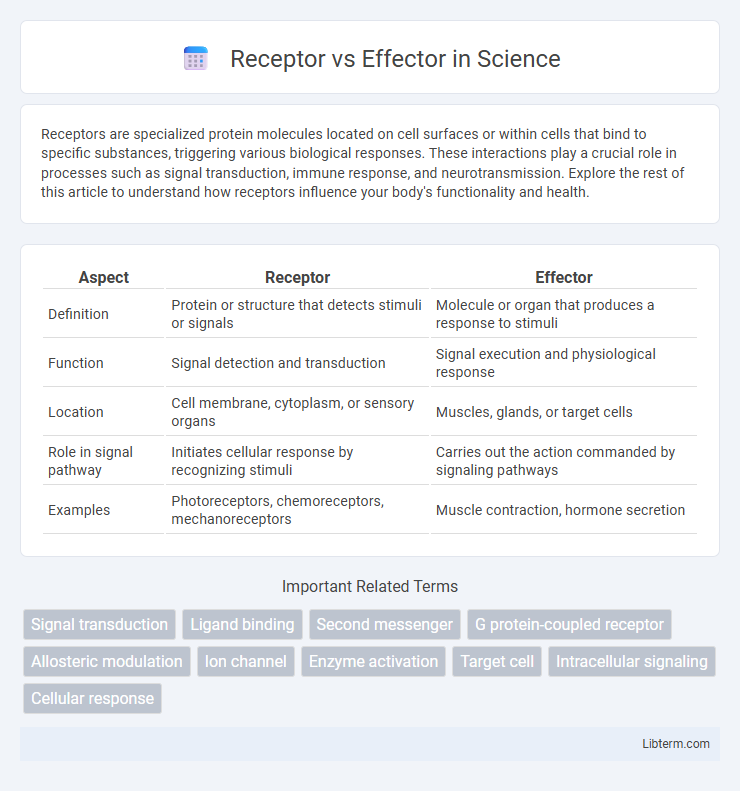Receptors are specialized protein molecules located on cell surfaces or within cells that bind to specific substances, triggering various biological responses. These interactions play a crucial role in processes such as signal transduction, immune response, and neurotransmission. Explore the rest of this article to understand how receptors influence your body's functionality and health.
Table of Comparison
| Aspect | Receptor | Effector |
|---|---|---|
| Definition | Protein or structure that detects stimuli or signals | Molecule or organ that produces a response to stimuli |
| Function | Signal detection and transduction | Signal execution and physiological response |
| Location | Cell membrane, cytoplasm, or sensory organs | Muscles, glands, or target cells |
| Role in signal pathway | Initiates cellular response by recognizing stimuli | Carries out the action commanded by signaling pathways |
| Examples | Photoreceptors, chemoreceptors, mechanoreceptors | Muscle contraction, hormone secretion |
Introduction to Receptors and Effectors
Receptors are specialized proteins or sensory cells that detect external stimuli and initiate cellular responses by converting signals into biochemical action. Effectors are molecules, cells, or organs that respond to signals from receptors by producing a physiological effect, such as muscle contraction or hormone secretion. The interaction between receptors and effectors is fundamental for maintaining homeostasis and enabling the body to respond dynamically to environmental changes.
Defining Receptors: Role and Mechanism
Receptors are specialized protein molecules located on the cell surface or within cells that detect and bind specific signaling molecules, initiating a biological response. Their primary role is to recognize extracellular signals and trigger intracellular pathways that regulate various physiological functions such as neurotransmission, hormone action, and immune responses. Mechanistically, receptors undergo conformational changes upon ligand binding, activating secondary messengers or ion channels to propagate the signal inside the cell.
What Are Effectors? Functions and Types
Effectors are molecules or cells that respond to specific signals from receptors to elicit physiological changes or cellular responses, playing a crucial role in signal transduction pathways. They function by converting receptor activation into biochemical actions such as enzyme activation, ion channel modulation, or gene expression changes. Common types of effectors include enzymes like adenylate cyclase, ion channels, and transcription factors, each facilitating distinct cellular outcomes in response to external stimuli.
Key Differences Between Receptors and Effectors
Receptors are protein molecules that detect and bind specific ligands or stimuli, initiating a cellular response by transmitting signals to the interior of the cell. Effectors are molecules, often enzymes or ion channels, that execute the response by altering cellular activity based on signals received from receptors. Key differences include their roles, with receptors serving as signal detectors and effectors acting as the active agents producing physiological changes.
Signal Transduction: From Reception to Action
Receptors detect extracellular signals and initiate signal transduction by undergoing conformational changes that activate intracellular pathways. Effectors are proteins or enzymes that produce the cellular response by amplifying and executing the transmitted signal. The interaction between receptors and effectors ensures precise signal relay from reception to specific biological action within the cell.
Examples of Receptors in Biological Systems
Receptors in biological systems include G-protein coupled receptors (GPCRs) like the beta-adrenergic receptor, ligand-gated ion channels such as the nicotinic acetylcholine receptor, and enzyme-linked receptors exemplified by receptor tyrosine kinases (RTKs) like the epidermal growth factor receptor (EGFR). These receptors detect extracellular signals, triggering intracellular pathways that regulate cellular responses. Their specificity and signal transduction mechanisms are critical for processes including hormone action, neurotransmission, and immune response.
Common Effectors in the Human Body
Common effectors in the human body include muscles and glands, which respond to signals from receptors that detect changes in the internal or external environment. Skeletal muscles execute voluntary movements while smooth muscles regulate involuntary functions such as digestion and blood flow, both activated via motor neurons following receptor stimulation. Endocrine and exocrine glands secrete hormones and enzymes respectively, modulating physiological processes to maintain homeostasis as directed by receptor-mediated neural or chemical signals.
Clinical Relevance: Disorders Involving Receptors or Effectors
Disorders involving receptors often include autoimmune diseases where antibodies target specific receptors, such as myasthenia gravis affecting acetylcholine receptors, leading to muscle weakness. Effector-related disorders frequently manifest as dysfunctions in signaling pathways, exemplified by G-protein coupled receptor effector malfunctions in certain types of heart failure. Understanding these receptor-effector interactions is crucial for developing targeted therapies, including receptor antagonists and effector enzyme inhibitors.
Advances in Research: Targeting Receptors vs. Effectors
Recent advances in targeting receptors versus effectors have shifted the landscape of therapeutic interventions, emphasizing precision medicine. Novel receptor-specific drugs leverage high-resolution structural data and ligand-binding dynamics to enhance selectivity and efficacy in conditions like cancer and neurological disorders. Effector-targeted therapies capitalize on understanding downstream signaling pathways, enabling modulation of cellular responses with improved specificity and reduced off-target effects.
Conclusion: Receptors and Effectors in Health and Disease
Receptors and effectors play critical roles in cellular communication and function, with receptors detecting signals and effectors executing physiological responses. Dysregulation of receptor or effector activity is associated with numerous diseases, including cancer, diabetes, and autoimmune disorders. Understanding receptor-effector interactions enables targeted therapeutic strategies to restore normal cellular function and improve health outcomes.
Receptor Infographic

 libterm.com
libterm.com